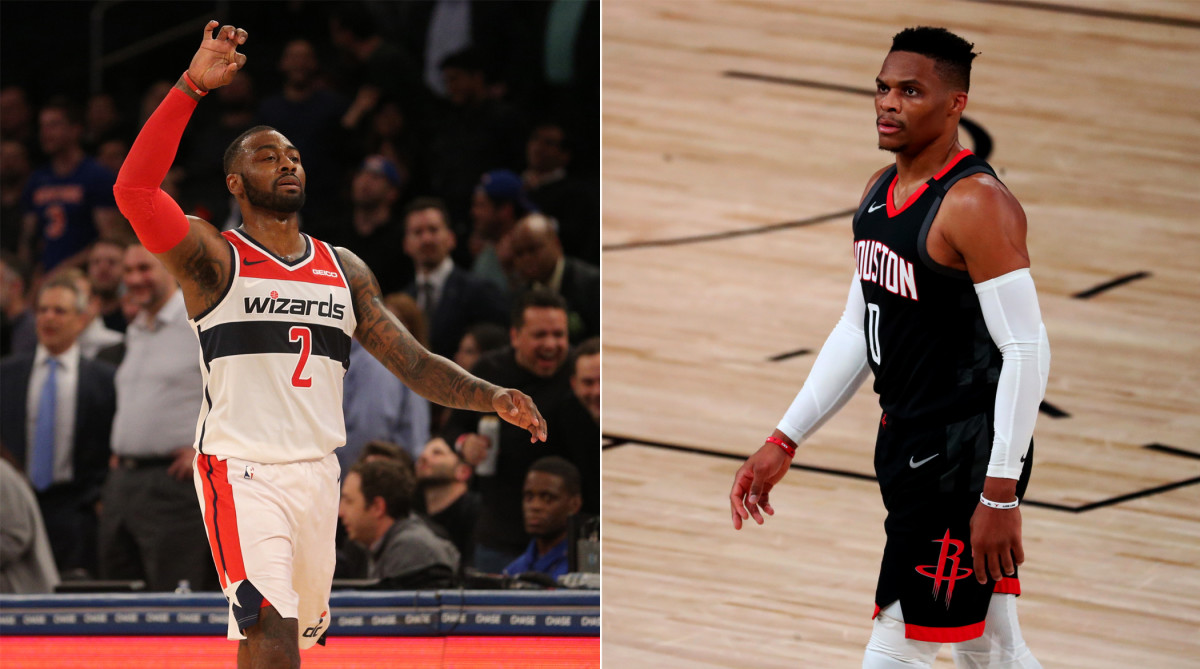Grading the Russell Westbrook-John Wall Trade
In what one can only hope was the final, strange stroke of a busy offseason, want-away stars Russell Westbrook and John Wall were traded for each other on Wednesday night, as first reported by ESPN’s Adrian Wojnarowski. The Rockets reportedly receive Wall and a 2023 protected first-round pick (per The Athletic's Shams Charania), with Westbrook heading to the Wizards, where he’ll reunite with coach Scott Brooks. It’s going take a little time to process this one, but let’s grade the deal anyway.

Rockets: C
It had appeared Houston was ready to bring back Westbrook and James Harden for another season, even with both players unsettled and eyeing the exit. The Rockets were always going to be more hesitant to move Harden, the bedrock of the franchise. Ultimately, trading Westbrook would seem to be the optimal move to try and ensure Harden’s happiness. The weight of his max contract, his slightly diminishing skill set, and a general lack of leverage made that a fairly difficult task. But in this case, Westbrook’s deal mirrors that of Wall (who's due slightly more money over the remaining three years). And so this turns into something of a challenge trade involving disgruntled stars entering the back third of their respective careers.
Picking up a real first-rounder without absurd protections grants Houston a slight degree of recompense for moving Westbrook, who’s two years older but a superior player to Wall. He also comes with a cleaner bill of health and a stronger winning history, and might actually fit better in Washington. At this point, with the trade market having mostly dried up and neither player likely to return real assets otherwise, the money factor is something of a sunk cost. The Rockets are essentially exchanging their old problems for new problems, and what they hope is a better chance at persuading Harden to stick around.
It’s hard to view this as any type of on-court win: Even with Westbrook’s reluctant willingness to co-exist with Harden last season, the fit was always going to be awkward. Wall is also a streaky three-point shooter, but he’s also never seriously played off the ball in his life. Assuming Harden is there when the season tips off in a few weeks, that dynamic could get dicey in a hurry. As for Wall, the general word seems to be that he’s healthy and somewhere close to his old self. But he’s still a speed-reliant, ball-dominant guard coming off a heel injury that required surgery as well as a torn Achilles in the same left leg, and he’s not getting younger. Houston probably had to do something, and since this was that something, at least it’s not a total punt on being competitive. But it’s hard to feel particularly good about any of this.
Wizards: C+
Washington brass had postured for weeks as if things were fine with Wall, even after his reported trade demand. Reading between the lines, that was probably some version of the truth, but objectively, Westbrook was the more desirable player, and this at least makes the Wizards better in the short term. Optically, even with all of Westbrook’s faults, this communicates the right message as far as building a winner around Bradley Beal is concerned. Sacrificing a protected first-round pick in a situation where the Rockets likely didn’t have a ton of leverage either stings a tiny bit. (The pick reportedly has lottery protection in 2023 that converts to top 12, top 10, and top eight over the three following drafts, and becomes two second-rounders if it hasn’t conveyed by 2026). Washington has to hope this is enough to move on from whatever negative energy Wall leaves behind, and that Westbrook settles in with a better degree of contentment.
Westbrook became a particularly enigmatic player to evaluate in Houston, due in part to his weird fit with Harden. But he still averaged 27 points per game last season and converted a career-high 51.4% of two-point attempts, even as his three-point clip dipped to 25.8%, his worst mark since 2010. In the regular season, Westbrook is still a guy who can take over games, take pressure off Bradley Beal, initiate the break off defensive rebounds, make plays for teammates and pour in effort on defense when it matters. He’s not quite the dynamo he once was, but with the money being roughly equal, he’s likely a superior option to Wall, with or without the injury factor. Westbrook certainly cares about winning games, but also seems to create friction wherever he lands, and there’s little doubt he’s going to want the ball in his hands as much as possible. The Wizards’ future likely now depends on their ability to generate buy-in from one of the most stubborn personalities in the league.
It should help that Beal is a better fit for Westbrook than Harden was, with a more natural off-ball skill set and a willingness to do his damage in non-iso situations. He likely won’t average 30 points per game again, but his three-point mark could inch closer to the neighborhood of 40%, which is where it hovered when Wall was in his prime and carried most of the offensive load. Beal’s offensive game expanded in concert with his massive usage rates the past couple seasons. Bringing in Westbrook comes with some risk, but it’s certainly a fresh start, and may give Beal a better chance of finding a neat intersection between elite efficiency and superstar-level usage.
Washington can walk away from this with a more defined sense of optimism. Still, if the fit doesn’t work, it’s anyone’s guess how long that lasts.
